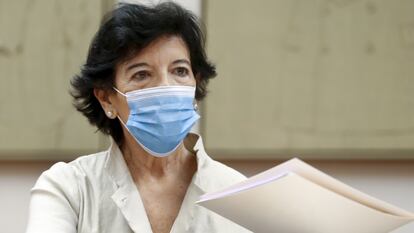Spain will prioritize return of under-12s to classrooms, says education minister
Isabel Celaá said during an interview this weekend that schools should make use of all available space during the upcoming academic year so that students can social distance

Spain’s Education Minister Isabel Celaá said during a radio interview this weekend that her ministry, the regions and the country’s schools are all seeking a way to get children back into classrooms when the new academic year starts in September – at least for the youngest students.
In order to do so, and so that two-meter social distancing can be observed in order to avoid transmission of the coronavirus, more space will be needed. Celaá suggested that all available areas should be used in schools – such as libraries and dining halls – to accommodate students.
The minister also explained that if there is not enough room for everyone, then children aged 12 and under should be given priority. Older students have already been able to continue their studies online, she said. “That doesn’t mean that we don’t want them there in person – we do,” she added. “We are going to do everything we can to have them there, but obviously infants [from babies to six year olds] and primary students [six to 12 year olds] need to be there in person and can’t do it any other way.”
At least six of Spain’s regions – who have devolved powers over education – have already begun to analyze all of the spaces and organizational measures needed so that at least the country’s youngest students will be able to return to the classroom on a daily basis from the next academic year. Celaá said that the ministry is working closely with the regions to make these preparations.
The minister also defended the government’s decision to restart classes in June for some students, due to the “therapeutic and emotional value for all students who saw their school year drastically change in just 24 hours.” Spain’s schools and universities began to close just before the middle of March, as the extent of the spread of the coronavirus throughout the population became clear.
“Face-to-face education is indispensable,” she continued. “We have tried to bring it back as far as has been possible.”
The minister also warned of the possibility of a new outbreak of the coronavirus in September, and said that as such, a contingency plan is being prepared. She added that the current school year would not be extended during the summer, in order to ensure “maximum normality” for the system and to give students and teachers a break.
Return to class in June
However, few children are expected to retake their places, and there have been complaints from schools that the government has left them to decide how to handle the situation given the need for social distancing – something that presents a huge challenge with the youngest students.
“We see it as impractical to occupy children of this age for four hours if they can’t share toys, can’t approach other children,” wrote the heads of schools in the Catalan county of Garraf. “Us teachers want to return to school, but a school that is exciting and alive, and not a ghostly place based on fear of contagion.”
With reporting by Ivanna Vallespín, Marc Rovira, Marta Rodríguez.
English version by Simon Hunter.
Tu suscripción se está usando en otro dispositivo
¿Quieres añadir otro usuario a tu suscripción?
Si continúas leyendo en este dispositivo, no se podrá leer en el otro.
FlechaTu suscripción se está usando en otro dispositivo y solo puedes acceder a EL PAÍS desde un dispositivo a la vez.
Si quieres compartir tu cuenta, cambia tu suscripción a la modalidad Premium, así podrás añadir otro usuario. Cada uno accederá con su propia cuenta de email, lo que os permitirá personalizar vuestra experiencia en EL PAÍS.
¿Tienes una suscripción de empresa? Accede aquí para contratar más cuentas.
En el caso de no saber quién está usando tu cuenta, te recomendamos cambiar tu contraseña aquí.
Si decides continuar compartiendo tu cuenta, este mensaje se mostrará en tu dispositivo y en el de la otra persona que está usando tu cuenta de forma indefinida, afectando a tu experiencia de lectura. Puedes consultar aquí los términos y condiciones de la suscripción digital.









































